Afghanistan War, CIA Sponsored Terror, Civil Liberties, FBI Intrusion, Human Rights, Political Prisoner, Surveillance, Targeting Muslims, Torture, Truth to Power, War Resister
Podcast: Play in new window | Download


Hosts Discussion On Snowden and Manning Cases.
Attorney Michael Ratner:
- There’s a lot of support out there for what Snowden revealed.
- This big program of massive surveillance against all of us, internet surveillance, cyber wars, there’s a tremendous amount of support for him. Editorials in the times basically saying it’s not treason.
- NYTimes: Snowden not nearly as reckless as Bradley Manning (same position as Faiza Patel at Brennan Center)
- Protecting Snowden and throwing Bradley Manning and the war crimes he revealed, under the bus.
- This whole claim that it was a data dump by Bradley Manning that he went into the documents and dumped everything not knowing what was in them is false. I know its false from sitting at the trial.
- I heard Bradley Manning testify as why he did each set of documents. The Iraq war logs, the Afghanistan war logs, the collateral murder video, the State Department cables.
- In each case he came with a moral and political reason for doing them.
- The fact that people are still accusing Bradley Manning of a data dump is outrageous and actually the prosecutors position.
- Snowden did something really important, we’ve all known or suspected we’re under massive surveillance. We now have it confirmed and its as bad or worse as we could imagine. It’s every phone call we make, everyone, every single phone call in this United States. It’s a surveillance program against us.
- What Bradley Manning revealed was the U.S. committing war crimes against others.
- I think its easier for American people to hear, “we’re being surveilled than to care about the fact that America is committing war crimes all over the world” because that actually goes to the heart of an imperialist country.
- Cypherpunks predicted exactly what happened: Surveillance is now cheap. You get decent quality storage of all German telephone calls on a certain type of computer for 30 million Euros including administrative overhead for pure storage.
—-
Attorney Heidi Boghosian:
- It really does away with the standards of reasonable suspicion or probable cause to open an investigation.
- It’s saying that we’ll open an investigation and this will be on information that hasn’t even happened.
- Stored Data: The government has access to that. There’s data out there that you can never really get rid of. Corporate intelligence firms or military contractors working with the government comprise about 70 percent what’s given to the intelligence budget.
- The government has to hire out contractors because they’re the only ones able to use this sophisticated technology. The data that is collected, stored and resold, contains a high rate of inaccuracy.
—
Attorney Michael Smith:
- Booze Allen which is the private contractor that Snowden worked for is part of the Carlyle Group.
- The Carlyle group is a private equity firm that’s worth a 158 billion dollars. The ruling class in this country own a chunk of the Carlyle Group.
- Clapper who’s know the head of national intelligence used to be a big executive with Booze Allan.
- The head of Booze Allan used to be one of the main guys at the National Security Agency.
- Privatizing Intelligence, the private sector has a duty to its share holders.
—————–
Pardon Ed Snowden
Pardon or Free Bradley Manning
https://petitions.whitehouse.gov/petitions
—
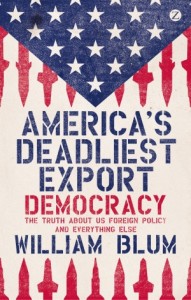
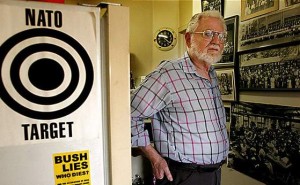
America’s Deadliest Export: Democracy
The United States war machine has been on auto pilot for the past 65 years says our guest William Blum he’s author of the recently published America’s Deadliest Export: Democracy – The Truth About U.S. Foreign Policy and Everything Else. This provocative book exposes the true motives of America’s foreign policy and outlines steps to take action.
William Blum:
- All this while I was looking to find reasons for it, to explain this weird record.
- What I was left with to believe that it’s world domination that the U.S. wants for various reasons.
- Once you understand that, many things become clearer, much less confusing.
- We’re dealing with a lifetime of indoctrination. It starts in kindergarten. People like you and I have a long battle on our hands to overcome this.
- We’re subjected to the indoctrination means well and its the most honorable and liberal government in the world.
- It’s reinforced in high school and college, on television, in the print media, it’s a major task for the likes of you and I to overcome this upbringing.
- It’s amazing the number of Americans that have seen through this upbringing despite this upbringing.
- I think the main to understand with this man called Barack Obama, is that there’s nothing that he strongly believes in except being President of the United States.
- The man doesn’t have any core beliefs. He’s not anti-empire, he’s not pro-empire, he likes being President.
- He’ll do and say whatever it takes to remain in that office. In my opinion, in Europe he’d be regarded as center-right.
- Look at the atrocities we carry out.
- Samantha Power is the author of a book on humanitarian intervention. Obama appointing these two women with that philosophy shows that he supports that philosophy. We have to assume they’re believers in humanitarian intervention.
Guest – William Blum, has been a freelance journalist in the United States, Europe and South America. His stay in Chile in 1972-3, writing about the Allende government’s “socialist experiment” and its tragic overthrow in a CIA-designed coup, instilled in him a personal involvement and an even more heightened interest in what his government was doing in various parts of the world. In the mid-1970’s, he worked in London with former CIA officer Philip Agee and his associates on their project of exposing CIA personnel and their misdeeds. His book on U.S. foreign policy, Killing Hope: U.S. Military and CIA Interventions Since World War II, first published in 1995 and updated since, has received international acclaim.
—
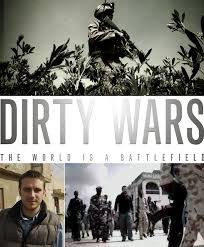
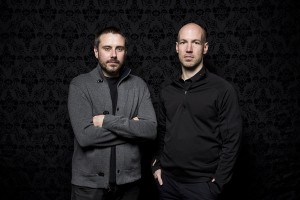
Dirty Wars: The World Is A Battlefield
The new documentary “Dirty Wars: The World Is A Battlefield” is an unique look into the covert wars brought by the United States. The film follows investigative reporter Jeremy Scahill into Afghanistan, Somalia and Yemen and analyzes expanded US drone warfare and the foreign policy that has allowed this destruction to take place. The film’s director Rick Rowley and Scahill went into these covert war zones to speak with families about the what they’ve seen and bring those stories back. As we’ve reported on Law and Disorder, the Obama Administration has continued to normalize the Bush Administration policies by empowering the Joint Special Operations Command and the use of drones.
Rick Rowley:
- The film is about the global covert war on terror.
- Jeremy and I have war reporters for over a decade. I became a war reporter because I thought the global war on terror was the most important story of our generation – killed hundreds of thousands of people cost untold billions yet most of it was unfolding in the shadows.
- Around the world today there are dozens of wars being fought in our name but without our knowledge and meaningful oversight.
- When we started shooting this film we thought it was a film just about Afghanistan. What we were seeing is the covert war in Afghanistan was eclipsing the covert war.
- More Afghans are killed and captured by covert units than by the entire 100 thousand strong NATO force that’s there.
- So we began to film to see what was up behind that.
- This is a unit that initially amounted to a few hundred guys who’s supposed to the most high level strategic missions, hostage rescue missions. If a nuclear weapon is stolen from the Ukraine they’d go and recapture it. That’s what they’re supposed to do.
- They’re doing 15-20 raids a night across Afghanistan, thousands of raids a year, going after mid level Taliban field commanders.
- The entire war is being fought by this clandestine group that wasn’t really built for this operation.
- We started to trace where JSOC was operating, that brought us to Yemen, and Somalia. Under the AQNX order, JSOC was authorized to operate in 26 countries clandestinely. Now under Obama 78 countries.
- I was staggered by the massive scale of this, the wholesale assassination machine.
- Current kill lists: It’s a permanent cycle of violence that’s being managed around the world.
- We interview Ron Weiden from the Senate Intelligence Committee. He’s a guy who’s trying to push for more disclosure and transparency in the Senate, but the entire time there’s a lawyer an aide inside the office who has to keep stopping him.
- There are secret interpretations of laws that exist on the books but would be shocking to the American people if they knew about them.
- We knocked on so many doors of night raids in Afghanistan, families shared stories with us of the most painful time in their life.
- They think that if the American people could only hear their story and their story were proven to be true, that somehow it would matter and make a difference.
- When we started this film 3 years ago, WBAI was talking about drones and kill lists, but it took until 6 months ago for that to work its way to editorial page of the Times and the Post.
- I’ve been a war reporter for more than a decade.
- Jeremy got on camera a number of whistle-blowers who are former operators or parts of JSOC, CIA people who are saying these kinds of discussion about blow back are happening inside their institutions.
- A lot of them talk about this as “mowing the lawn” the jihadists, insurgency will rise up and you go and chop it off but the grass will rise again.
- That’s permanently managing a level of acceptable chaos and violence. This war remains secret for a reason, that if everyone knew about it there would be a popular outrage.
Guest — Rick Rowley, is a director and cinematographer. Over the course of fifteen years, Richard Rowley, co-founder of Big Noise Films, has made multiple award-winning documentary features including Fourth World War and This Is What Democracy Looks Like. His shorts and news reports are also regularly featured on and commissioned by leading outlets including Al Jazeera, BBC, CBC, CNN International, Democracy Now!, and PBS. Rowley is a co-founder of the Independent Media Center. Rowley has been a Pulitzer Fellow, Rockefeller Fellow, a Jerome Foundation Fellow, and a Sundance Documentary Film Program Fellow.
———————————————————-
Afghanistan War, Civil Liberties, FBI Intrusion, Human Rights, Surveillance, Targeting Muslims, Torture, War Resister
Podcast: Play in new window | Download
Updates:
- ‘We Steal Secrets’: State Agitprop by Chris Hedges
- Banality of Don’t Be Evil – A Response To The Book – The New Digital Age
- Michael Ratner Discusses Bradley Manning Trial – Hundreds of Protesters
- Get Whistleblowers First Then Journalists
- A Phone Call To Save Lynne Stewart’s Life:
- Attorney General Eric Holder – 1 202 514 2001
- White House President Obama – 1 202 456 1414
- Federal Bureau of Prisons – Director Charles Samuels – 1 202 307 3198 ext 3
——
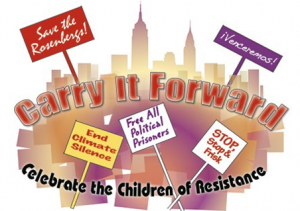
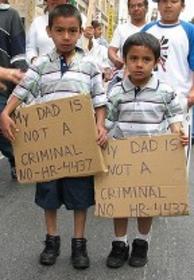
Carry it Forward: Celebrate the Children of Resistance – 60th Anniversary of Rosenberg Execution
Today we speak to Robert Rosenberg, the younger son of Ethel and Julius Rosenberg. He’s an author, activist, attorney and public speaker. He sued the FBI and CIA to force the release of 300 thousand previously secret documents about his parents. Robert founded the Rosenberg Fund For Children which provided educational and emotional needs of both targeted activist youth and children whose parents have been harassed, injured, jailed or died because or during their activism. This week the event Carry it Forward: Celebrate the Children of Resistance – 60th Anniversary of Rosenberg Execution on Sunday June 16, 2013.
Robert Meeropol:
- The Rosenberg Fund For Children is a public foundation that provides for the educational and the emotional needs of the children of targeted activists in the United States.
- I founded this organization in 1990. We help hundreds of children of targeted activists.
- In some ways you can say that the Rosenberg Fund For Children was a vehicle for me to create something positive in response to the destruction that was visited upon me when my parents were arrested when I was just 3 years old.
- Judge Kaufman’s sentencing statement justifying a death sentence after a conviction for conspiracy to commit espionage by using the word treason.
- The parallel today is the Bradley Manning case which is going on right at this moment. He is being charged with conspiracy to commit espionage under the exact same law that my parents were charged under.
- The question being asked is: Is he a whistle-blower or is he a traitor?
- We now know from the government’s own files that my parents had nothing to do with the secret of the atomic bomb.
- The government wanted to make a big show trial and demonstrate that people who wanted to take this conscious driven action posed a threat to the entire nation.
- Sixty years on, this case is just as relevant today as the day it was born.
- The change that has occurred is the government learned the lessons of my parents’ case and has now figured out ways in post 911 America to make all the illegal activities that they engaged in in other to obtain this big show trial conviction in the 1950s legal today.
- We went through hell between the years of the arrest and the execution. I grew up with this sense, this unmet need to do something about this.
- It wasn’t until I was 43 years old in 1990 that I figured out what to do and that was to start a foundation in my parents name that would help children and young people in similar circumstances today.
- Law and Disorder Interview On The Rosenbergs
Guest – Robert Meeropol, the younger son of Ethel and Julius Rosenberg. In 1953, when he was six years old, the United States Government executed his parents for “conspiring to steal the secret of the atomic bomb.” For more than 40 years he has been a progressive activist, author and public speaker. In the 1970’s he and his brother, Michael, successfully sued the FBI and CIA to force the release of 300,000 previously secret documents about their parents. He earned undergraduate and graduate degrees in Anthropology from the University of Michigan, graduated law school in 1985, and was admitted to the Massachusetts Bar
——-


Welcome to the Gilded City of New York: Low Wage Workers Unite
Last month in an article titled Welcome to the Gilded City by The Nation, the collaborative work of editors compiled a detailed overview of Mayor Bloomberg’s legacy. The article assesses the various personas the New York mayor used to further specific agendas, among them are the “top cop” presiding over a vast surveillance program, the union buster waging war on organized labor, the imperialist undermining the city’s term limits. New York City’s income inequality has grown rapidly in the last 3 decades, outpacing New York state and the nation. The article points out that there were choices available to New York City’s government to counter this economic trend yet they’ve been basically ignored.
Lizzy Ratner:
- We’re at a fulcrum moment in New York City, we’re at the end of the Bloomberg era, he is finally term limited at the end of this year.
- In thinking about what New York City is now, we came upon a central theme and that is “inequality.”
- Peel back the cellophane a little bit and what you see is deep struggle, deep poverty.
- Because New York is an emblem sometimes for the larger country, what does it tells us about the country?
- In 1980 about 21 percent of New York City’s population lived at or below the federal poverty line.
- In the last 30 years we’ve had effectively no progress in the realm of fighting poverty in this city.
- In 2011, about 400 thousand people or about 1 out of 10 of the city’s workers, worked by didn’t earn enough money to get out of poverty.
- That same year about 600 thousand people earned 10 dollars an hour or less.
- The point of the metaphor was to contrast these two New York Citys, these two different worlds. The gilded world, which is flashy, which everybody sees on TV, which is the one that’s been promoted by the Bloomberg administration.
- There is this perception of Bloomberg as a great liberal icon. There is a certain disturbing truth to that in that liberalism is being defined these days as social progressiveism.
- We have these sacrificed populations in the city which are being targeted.
- The mayor took control of public schools, claimed control when he took office. The justification for that was this was a way to tame an unruly system, narrow the education gap between students of color and white students.
- One of his signature failures (Bloomberg) was not addressing the horrifying inequality and job loss (during recession)
- Bloomberg Obstructed or Vetoed: Paid Sick Leave Law, Living Wage Bill, Anti-Predatory Lending Bill
- If you want to look at Bloomberg’s failure around poverty you just need to look at homelessness. Homelessness had almost doubled under his tenure.
- A lot of organizations and grass roots groups have started building power and have come together in various ways to change conditions for workers in this city.
Guest – Lizzy Ratner, co-editor of this Nation article. Lizzy is a journalist and co-editor of The Goldstone Report: The Legacy of the Landmark Investigation of the Gaza Conflict.
Past Law and Disorder interviews with Lizzy Ratner
—————————————————–
Afghanistan War, CIA Sponsored Terror, Civil Liberties, Criminalizing Dissent, Cuba, Extraordinary Rendition, FBI Intrusion, Guantanamo, Habeas Corpus, Human Rights, Political Prisoner, Surveillance, Targeting Muslims, Torture, War Resister
Podcast: Play in new window | Download
Updates:
- A Phone Call To Save Lynne Stewart’s Life:
- Attorney General Eric Holder – 1 202 514 2001
- White House President Obama – 1 202 456 1414
- Federal Bureau of Prisons – Director Charles Samuels – 1 202 307 3198 ext 3
—-


Jeremy Hammond, Bradley Manning and Julian Assange: Michael Ratner
Michael Ratner discusses attending Jeremy Hammond guilty plea in open court last month, Bradley Manning’s trial that starts June 3, 2013 at Fort Meade and how a Fox News reporter feels the same chilling effect of free speech by having his investigative work under suspicion as co-conspirator or aiding and abetting.
Jeremy Hammond: “Now that I have pleaded guilty it is a relief to be able to say that I did work with Anonymous to hack Stratfor, among other websites,” according to a statement released by Hammond on Tuesday. “Those others included military and police equipment suppliers, private intelligence and information security firms, and law enforcement agencies. I did this because I believe people have a right to know what governments and corporations are doing behind closed doors. I did what I believe is right.”
- Jeremy Hammond pleaded guilty to one count of conspiracy to access a protected computer.
- It’s under the Computer Fraud and Abuse Act.
- Jeremy Hammond was facing 32 years to life. He could be sentenced to up to 10 years.
- Interestingly, Wikileaks doesn’t appear in what he pleaded to. He or the group uploaded some 5 million emails.
- One of the emails is about a sealed indictment on my client and CCRs client Julian Assange.
- Julian Assange: Jeremy is a political activist and whistle-blowing is one of the means he uses for political activism.
- Bradley Manning pleaded guilty to 20 years in prison already. The key crime they’re trying to get Bradley for is aiding the enemy.
- The government is sledge hammering any criticism from a military person.
- Petition for Jeremy Hammond
Law and Disorder Co-host Attorney Michael Ratner, President Emeritus of the Center for Constitutional Rights (CCR), a non-profit human rights litigation organization based in New York City and president of the European Center for Constitutional and Human Rights (ECCHR) based in Berlin. Ratner and CCR are currently the attorneys in the United States for publishers Julian Assange and Wikileaks. He was co-counsel in representing the Guantanamo Bay detainees in the United States Supreme Court, where, in June 2004, the court decided his clients have the right to test the legality of their detentions in court. Ratner is also a past president of the National Lawyers Guild and the author of numerous books and articles, including the books The Trial of Donald Rumsfeld: A Prosecution by Book, Against War with Iraq and Guantanamo: What the World Should Know, as well as a textbook on international human rights.
—–
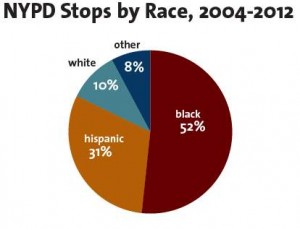

Stop and Frisk Lawsuit Closing Arguments
Closing arguments were heard on both sides last week on the Stop and Frisk case known as Floyd v. City of New York. This is a class-action lawsuit challenging the NYPD’s unconstitutional stop-and-frisk policy. The case charges the NYPD with a policy and practice of unreasonable, suspicion-less and racially discriminatory stops in violation of the Fourth Amendment’s prohibition against unreasonable searches and seizures and the Fourteenth Amendment’s Equal Protection Clause barring racial discrimination.
Stop and Frisk has increased over 600 percent in New York City. In 2009 New York City, a record 576,394 people were stopped, 84 percent of whom were Black and Latino residents — although they comprise only about 26 percent and 27 percent of New York City’s total population respectively. Ten years of raw data obtained by court order from the New York City Police Department (NYPD) showed that stop-and-frisks result in a minimal yield of weapons and contraband.
CCR Senior Staff Attorney Darius Charney:
- The closing was really interesting because the judge asked a lot of questions of both sides.
- It was more like an oral argument as you would do in an Appeals Court.
- This was a bench trial, there was a judge but no jury.
- Because of that the judge herself took the role of asking a lot of questions of witnesses.
- I think the police departments’ at least public position on this is really a problem created by a bunch of left wing lawyers and the media.
- In our class action (8 years) there have been over 4.5 million recorded stops by the police department but the actual number of stops are probably higher. About 90 percent of that 4.5 million there is no discovery of criminal activity – 90 percent are released and not given a ticket.
- The police department claims the focus of this program is to get illegal guns off the street about .13 percent results in the recovery of a gun.
- You actually find a gun one or two times out of a thousand.
- Reasonable, articulatable suspicion which the Supreme Court set out about 45 years ago – Terry v Ohio.
- (NYPD) they were very frank about it and sincere when they said – Look most reported crime is black or latino suspect
- If you’re talking about individualized suspicion just because someone happens to be the same race as crime suspect doesn’t make them suspicious.
- The two most common reasons these police officers are checking off on the forms for why they stop people is furtive movements and high crime area.
- They’ll try to muddy the waters by trying to mischaracterize what it is we’re actually complaining about. How can you criticize us for sending more police officers to high crime neighborhoods.
- What we’re complaining about is how officers behave there and how they treat the people who live there.
- Opening statements: It’s difficult to try to synthesize that much evidence into an hour and a half.
- This fight really goes back 14-15 years to the late 90s and what happened after the murder of Amadu Diallo.
- The first lawsuit that they did, the Daniels Case came about because of the work of grassroots organizations.
- Communities United For Police Reform
- We anticipate by July we will know what she (the judge) will decide.
- We learn the lesson if you leave it up to the police department and this mayoral administration to change things on their own, they’re not going to do it because they think what they’re doing is right.
Guest – Attorney Darius Charney, senior staff attorney in the Racial Justice/Government Misconduct Docket. He is currently the lead counsel on Floyd v. City of New York, a federal civil rights class action lawsuit challenging the New York Police Department’s unconstitutional and racially discriminatory stop-and-frisk practices, and Vulcan Society Inc. v. the City of New York, a Title VII class action lawsuit on behalf of African-American applicants to the New York City Fire Department which challenges the racially discriminatory hiring practices of the FDNY.
—
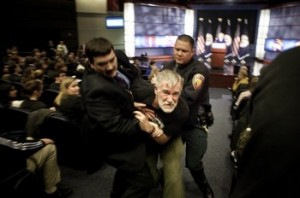
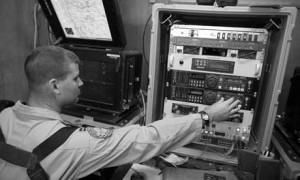
Doubting Obama’s Resolve To Do Right: Ray McGovern
We continue our discussion on killing people using drone warfare with returning guest Ray McGovern. When President Obama delivered a major speech on counter-terrorism, he announced a shift in his administration’s use of drones. The Obama Administration has conducted hundreds of drone strikes in several countries, killing civilians and so far reported, four US citizens. Critics point out that as the Obama Administration assassinates its’ suspects, it also avoids the legal complications of detention. London based bureau for investigative journalism estimates that about 830 civilians including women and children may have been killed by drone attacks in Pakistan. 138 in Yemen, and 57 in Somalia.
Former CIA analyst Ray McGovern:
- It was a masterpiece of oratory and rhetoric, but it was deceptive through and through.
- Those of us who had been watching this know he lied through his teeth on many occasions.
- He has the power as we all know to release 86 prisoners (Guantanamo) in the next hour.
- Why would he do all that? Why would he be afraid to take the drones away from the CIA?
- Well, I’ve come to the conclusion that he’s afraid. He’s afraid of what happened Martin Luther King Jr.
- At a small dinner with progressive supporters – after these progressive supporters were banging on Obama before the election . . . Why don’t you do the things we thought you stood for? Obama turned sharply and said Don’t you remember what happened to Martin Luther King Jr.?
- I’m convinced the President of the United States is afraid of the CIA.
- Does he have any reason to fear the CIA? Well he sure as heck does. For those of your listeners who have not read James Douglas’ JFK and the Unspeakable, you need to read that, because it’s coming up on 50 years.
- John Kennedy signed 2 executive orders just a month or so before he was killed. One of them said we’re pulling out a 1000 troops from South Vietnam. The other said we’re pulling out the bulk of the troops by 1965, we’re finished in Vietnam.
- I think he’s just afraid and he shouldn’t have run for president if he was going to be this much of a wuss.
- My father was professor of law at Fordham University for about 35 years. My daughter, my brother, their all lawyers. I have this notion that when someone comes in after building a record against torture and kidnapping, and black sites, and they come in and say we think this is bad but nobody should be prosecuted for it. .
- It’s not a dichotomy here, it’s deliberate duplicity with a rhetorical flourish.
Guest – Raymond L. McGovern, retired CIA officer turned political activist. McGovern was a Federal employee under seven U.S. presidents in the past 27 years. Ray’s opinion pieces have appeared in many leading newspapers here and abroad. His website writings are posted first on consortiumnews.com, and are usually carried on other websites as well. He has debated at the Oxford Forum and appeared on Charlie Rose, The Newshour, CNN, and numerous other TV & radio programs and documentaries. Ray has lectured to a wide variety of audiences here and abroad. Ray studied theology and philosophy (as well as his major, Russian) at Fordham University, from which he holds two degrees. He also holds a Certificate in Theological Studies from Georgetown University.
————–
Law and Disorder March 3, 2010
JFK and the Unspeakable: Why He Died and Why It Matters by Jim Douglass
Jim Douglass:
- John F. Kennedy’s experience in WWII: He was in the South Pacific, he volunteered. He was on that PT boat.
- What happened on that PT boat, is that it got split into two by a Japanese destroyer. He lost brothers and friends at that time. An extraordinary experience being adrift on the ocean warning other PT boats. The experience create a distrust in military authority.
- He said that he wanted to splinter the CIA into a thousand pieces and scatter to the winds.
- As Kennedy said to his friends, “they figured me all wrong.”
- The Unspeakable: the kind of evil and deceit that seems to go beyond the capacity of words to describe. The midst of war and nuclear arms race, the assassinations of Kennedy, Martin Luther King and Malcom X that the term was used.
- JFK’s vision is articulated in the address June 10, 1963, arising from the turnaround of the missile crisis and Bay of Pigs.
- He wanted to move step by step into a disarmed world. Nikita Khrushchev put that speech all over the Soviet Union. The Cuban Missile Crisis is a deeply misunderstood part of our history, because it’s usually portrayed as Kennedy going to war with Nikita Khrushchev and beating him.
- The truth was that Kennedy and Nikita Khrushchev were in over their heads, the US generals wanted nuclear war, because they had more warheads than the Soviets.
- Nikita Khrushchev: We now have a common enemy from those pushing us toward war.
- At that point the Cold War turned upside down because Kennedy and Khruschev became closer to each other than either was toward their own military power system.
- Vietnam: Kennedy’s military people would not give him an exit policy. He signed the withdrawal order from Vietnam before he was assassinated.
- His friends said that he had an obsession with death. It was not an obsession but a real assessment that he was going to die. If you try to turn around a national security state that is dominating the world,
- and you do so as president of the United States, of course you’re going to die. Kennedy knew that.
- The book is a story on the deliberate destruction of hope, the vision of change, a turning of this country all of which was happening and had to be stopped. US Agencies killed Dr. Martin Luther King – 1999 Verdict
- We’re in the same scene right now with Petraeus and McChrystal setting up Obama. They were dictating terms to Obama, unlike Kennedy, he did not face them down.
- We need to get out ahead of Obama so that he can do something.
Guest – James W. Douglass, author and longtime peace activist.
————————————————————
Afghanistan War, Civil Liberties, Criminalizing Dissent, Death Penalty, Extraordinary Rendition, Guantanamo, Habeas Corpus, Human Rights, Military Tribunal, Political Prisoner, Prison Industry, Targeting Muslims, Torture, Truth to Power, War Resister
Podcast: Play in new window | Download
Updates:
- FDNY Lawsuit Update
- Guatemalan Genocide Verdict Overturned
——
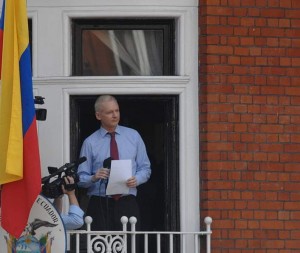
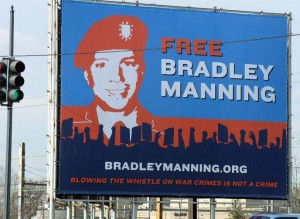
We Steal Secrets: The Story of Wikileaks – Michael Ratner
Our own Michael Ratner delivers a critical review of the film documentary “We Steal Secrets: The Story of Wikileaks” by director Alex Gibney. The annotated transcript, reveals errors, rank speculation and a focus on personality that detracts from the important revelations by Manning and published by WikiLeaks. Bradley Manning’s 12-week trial commences on Monday (3 June) and the film may have been released to take advantage of that date. Manning may face life in prison and could potentially face the death penalty. Julian Assange remains in the Ecuadorian embassy legitimately fearful that extradition to Sweden is a one way ticket to the US and potential for life in prison.
Attorney Michael Ratner, attorney in the US for Julian Assange and Wikileaks:
- (The film) does a great disservice to Bradley Manning and Julian Assange.
- I think it trivializes the incredible courage that both of them had as well as what was revealed by the documents.
- Julian Assange declined an interview by Alex Gibney and no one currently associated with Wikileaks participated in the film. This may explain in part Gibney’s poor treatment of Julian Assange.
- What grabs you immediately is the title, “We Steal Secrets: The Story of Wikileaks.” Wikileaks is a publisher. Yet the title implies that the story of Wikileaks is the story of it stealing secrets.
- That implication plays into the government’s theory that somehow Wikileaks and Julian Assange are co-conspirators with Bradley Manning in taking secrets. The film does so in other places as well.
- A second criticism is that part of the film focuses on Bradley Manning’s psychological problems and implies that those are the basis for Manning’s revelation of documents.
- Gibney has said as much in interviews given after the film: “I think it raises big issues about who whistleblowers are, because they are alienated people who don’t get along with people around them, which motivates them to do what they do.”
- In fact, Manning gave an incredibly moving political explanation for each leak of documents; an explanation not covered in any detail in the film.
- Third, Gibney claims Wikileaks is dead. Nothing could be more of fable.
- Since December 2011 Wikileaks has released the SpyFiles, the Stratfor emails dubbed the GIFiles, the Syria Files and in April 2013 both Cablegate and 1.7 million Kissinger Cables in an easily searchable Plus Public Library of US Diplomacy.
- Fourth, somehow, Gibney claims there are no charges filed against Julian Assange. How does he know that? It’s a secret Grand Jury, and if there’s an indictment, it’s going to be a sealed indictment because an indictment is not made public when a person is not in custody. In fact, there is significant, irrefutable evidence of an on going investigation and its likely there is a sealed indictment.
- Gibney diminishes the risk to Julian Assange if he were sent to the United States because he wants to claim that Assange is in the embassy to avoid going to Sweden to answer questions about sexual misconduct allegations. But it does not work. Were Sweden to guarantee Assange would not be sent to US he would go there to answer questions.
- Assange has also offered to answer those questions in the embassy–Sweden has refused. In the end, the problem is the United States–Gibney, in his effort to demean Assange, needs to play down the huge risk he faces in the US.
Law and Disorder Co-host Attorney Michael Ratner, President Emeritus of the Center for Constitutional Rights (CCR), a non-profit human rights litigation organization based in New York City and president of the European Center for Constitutional and Human Rights (ECCHR) based in Berlin. Ratner and CCR are currently the attorneys in the United States for publishers Julian Assange and Wikileaks. He was co-counsel in representing the Guantanamo Bay detainees in the United States Supreme Court, where, in June 2004, the court decided his clients have the right to test the legality of their detentions in court. Ratner is also a past president of the National Lawyers Guild and the author of numerous books and articles, including the books The Trial of Donald Rumsfeld: A Prosecution by Book, Against War with Iraq and Guantanamo: What the World Should Know, as well as a textbook on international human rights.
——-
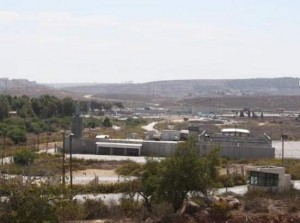
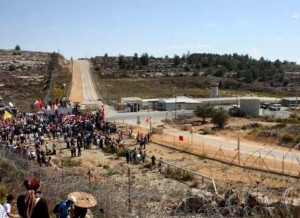
Palestinian Prisoners Legal Support: Addameer
On the 17th of April, hundreds of Palestinians filled the streets in the West Bank in protest to mark Palestinian Prisoners Day. Right now there nearly 5000 Palestinian security prisoners in Israeli jails, 14 of them are women. More than half have been convicted, 33 percent have not been sentenced and 3 percent are being held in administrative detention. 235 of Palestinian prisoners are minors ranging in age from 14 to 18. As many listeners may know, Palestinian activists are often targeted and detained. In prison, tactics are used such as solitary confinement and forbidding family contact.
Attorney Sahar Francis:
- Currently there are still 4900 Palestinians inside Israeli prisons. Most of them are adults. There are 236 minors under age 18. 14 women and 14 Parliamentarians.
- The majority of them I would say were arrested because of political activism and being involved in the peaceful struggle, and resistance especially in the last couple of years against the wall, the checkpoints, the settlements, land confiscation, house demolition all these practices of the occupation.
- Including Jerusalem residents, they would be arrested inside Israel but they could be subjected to 2 different legal systems. The Israeli legal system or the military system that applies just to the Occupied Territories.
- Settlers are not subjected to the military court system that is imposed on the Palestinians in the Occupied Territories.
- It’s violation of International Law to move them to prisons inside Israel. This is what Israel was doing since 1995.
- They moved the prisoners from prisons inside the Occupied Territories to prisons inside Israel and this is a violation for the 4th Geneva Convention Act actually.
- The number of Palestinian prisoners decreased compared to previous years, 2005, 2006.
- Since 1967 til today more than 750 thousand Palestinians were arrested. It’s almost hitting every Palestinian house. It’s estimated to be about 40 percent of the Palestinian men population that were at least once incarcerated in their life.
- In the 7 years of Oslo, Israel kept 1500 political prisoners.
- Now I can say that the majority of the prisoners would be sentenced for periods less than 10 years.
- There’s around 430 of them sentenced for life.
- We still have cases of families where they have 4 sons or 5 sons in the same time in prison.
- In some cases they (the sons) would be distributed in all prisons, in north, south of Israel and the mother would be traveling all the way trying to visit them.
- The women prisoners number was much higher we used to have 120 female prisoners.
- Most of them involved in political activism, mainly supporting their brothers or husbands in their political activism or in stop cases involved in trying to stop soldiers.
- Addamer was established in 1991 by ex Palestinian political prisoners and lawyers who were aiming to give legal support for free to Palestinian prisoners in military court system.
- Our focus is on political arrests. We have 8 members in Addamer. We are members of the Israeli Bar Association and members of the Palestinian Bar Association.
- Most of the cases in military court would end in plea bargain without exhausting the system because neither the system or the lawyers don’t have much trust in the system.
- You could end up being interrogated in the detention centers inside Israel and they will decide whether to transfer the case for the civil prosecution or the military prosecution.
- You can have a person 90 days before charging them (military system) Civil system it’s 35 days.
- Law In These Parts – Film Documentary.
- Regarding torture and terms such as enhanced interrogation techniques : In our place its called moderate physical pressure.
- We can’t sue them because the prosecutors claim out of necessity we used the torture.
- Seeing the photos of Abu-Ghraib with this sack on the detainee’s heads, this was used in the Palestinians case since the early years of the occupation.
- This is the method that was used to prevent them from breathing, from sleeping, and they were tied to these kindergarten small chairs with the sack on their head, with playing music 24 hours a day. Then after in this position for 2 weeks, the interrogator shake you.
- We’re promoting Boycott Divest and Sanction.
Guest – Sahar Francis, human rights lawyer and director of the Palestinian NGO Addamer. (Arabic for conscience) Prisoners Support and Human Rights Association is a Palestinian non-governmental, civil institution which focuses on human rights issues. Established in 1992 by a group of activists interested in human rights, the center offers support to Palestinian prisoners, advocates the rights of political prisoners, and works to end torture through monitoring, legal procedures and solidarity campaigns.It’s an organization offering legal services to political prisoners under Israeli occupation and represents prisoners in Israeli military and civil courts.
————————————————————–
Afghanistan War, CIA Sponsored Terror, Civil Liberties, Criminalizing Dissent, FBI Intrusion, Guantanamo, Habeas Corpus, Human Rights, Political Prisoner, Prison Industry, Surveillance, Targeting Muslims, Torture, Truth to Power, War Resister
Podcast: Play in new window | Download
Updates:
——-
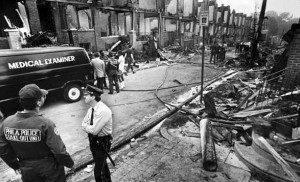

MOVE Bombing: 28th Anniversary
This week marks the 28th anniversary of an armed police mission in Philadelphia that ended in a helicopter bombing of the headquarters of the group known as MOVE. The fire commissioner in that city allowed a fire to rage unabated at 6221 Osage Avenue in West Philadelphia, killing six adults and five children, destroying 65 homes and leaving more than 200 people homeless. Despite two Grand Jury investigations, and a commission finding that top officials were grossly negligent, no one from city government was ever criminally charged. A recent film called Let the Fire Burn, chronicles the events leading up to the conflagration.
Ramona Africa:
- The government, through the media had mislead people to believe that what happened in May of 1985 was because of complaints from neighbors which is absolutely not true.
- What happened on May 13, 1985 happened because of our unrelenting fight for the release of our innocent sisters and brothers known as the MOVE 9 who were arrested in August 1978.
- After years of abuse, physical abuse, judicial abuse by this system, MOVE babies being killed through miscarriage and a 3 week old baby being trampled to death by police, after countless unprovoked beatings of MOVE men and women, children, even pregnant women, MOVE people took a stand and said listen, we are uncompromisingly opposed to violence, we’re a peaceful people. We’re not stupid and we’re not masochistic or suicidal.
- We do believe in self defense which is the law, the law of life. There is not a species on this Earth that doesn’t defend itself, when threatened, when attacked.
- When MOVE took that stand, the government became enraged.
- They alleged housing code violations, and they wanted MOVE to move out of the home based on housing code violations.
- MOVE people wouldn’t go along with that. A judge gave MOVE people til August 1 to get out.
- On August 2, 1985, a judge issued warrants on any MOVE people he knew of including people he knew were not in the house.
- After the warrants were issued, hundreds and hundreds of cops were sent out to our home.
- They shot thousands of bullets into that house. The fire department used deluge hoses to flood our home.
- The officer that was killed was standing on street level while everybody including the police acknowledged that all MOVE people were in the basement of our home.
- This policeman was shot from a bullet traveling on a downward angle.
- Hours after I was arrested on August 17, the city sent a demolition team out and completely demolished MOVE’s home which was the scene of the crime.
- The MOVE 9 trial was a bench trial, not a jury trial.
- They did it to silence our righteous protest and our unrelenting fight for the release of our family the MOVE 9.
- They came out to our home on Mother’s Day, May 12 1985, with warrants they obtained on May 11.
- The Fire Department as in 1978 was their first mode of attack.
- They came out there to kill, that’s the bottom line.
- When their ten thousand rounds of bullets didn’t kill us, the water hoses, the tear gas didn’t do the job, they concocted a bomb made from powerful military explosives, C4.
- They got the C4 from the federal government, from the FBI.
- The state police helicopter flew over our home without any warning, and two Philadelphia Police bomb squad police officers dropped that bomb on the roof our home. It ignited a fire. They made a conscious decision not to put the fire out.
Guest – Ramona Africa, the sole adult survivor of the 1985 police bombing of the home occupied by members of the MOVE organization. Email Ramona – onamovelleja (at) gmail.com
——–
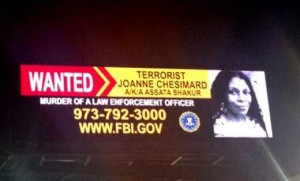

Assata Shakur Placed On FBI Terror List
Last week, the FBI placed Assata Shakur on its Most Wanted Terrorists list, while the state of New Jersey raised the bounty on her head to 2 million dollars. These actions fall on the 40th anniversary of the 1973 shoot out in in which police allege Shakur killed a police officer during a traffic stop on the New Jersey turnpike. Assata also known as JoAnne Deborah Byron is an African American activist was a member of the Black Panther Party and the Black Liberation Army. Assata Shakur: Understanding the politics behind the FBI’s new attack.
Eugene Puryear:
- I think why a 65 year old grandmother has been put on the FBI terrorist list is a reflection of the United States government’s fear of that which opposes it.
- Assata Shakur was part of the 60s movements . . . a movement that the Nixon administration attempted to criminalize, to say that political dissent and political opposition to the US government and its imperial moves around the world.
- She does fit the profile of what the US government has been trying to perpetuate for the last 30 years, in a sense an extension of COINTELPRO.
- One person’s terrorist is another person’s freedom fighter.
- Assata Shakur, her actions and beliefs is certainly not something that is beyond the pale but the US government view her as a terrorist.
- By placing her on this terrorist list, it’s a way of criminalizing dissent.
- Assata’s trial was moved several times, it was placed in counties that were mostly wealthy, mostly white where pre-trial publicity around the case had biased people in a major way against Assata Shakur.
- When the government wants to put someone away and they know they don’t have the evidence they want to do everything possible to both manipulate the venue and also bring in people whose predisposition will make them more likely to believe the government’s version of events.
- Assata was in a position to be put in prison for the rest of her life in these human-breaking conditions.
- The day before this happened, the US government refused to remove Cuba from the state sponsors of terrorism list. This is used in part for keeping Cuba on that list.
- Also to give a chilling effect to progressive movements in the United States.
- The US seems to be redefining what are terrorist actions and what its responses are.
- The lock down of Boston, the reclassification of Assata Shakur, the issuing of the drone memo of what eminence actually means.
- The US is attempting to create enough ambiguity in the statutes.
Guest – Eugene Puryear, Eugene is a writer and on the editorial board of the Liberation, Newspaper of the Party for Socialism and Liberations.
—–
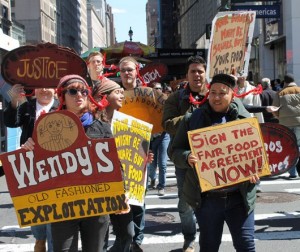

CIW – Fair Food Program: Wendy’s
Last year Trader Joe’s and the Coalition of Immokalee Workers signed an agreement that formalized the ways in which Trader Joe’s support the CIW’s Fair Food Program, a hard won victory.. Since then efforts have turned to companies such as Publix supermarkets in Florida and the Wendy’s fast food chain. Recently, Fair Food activists across the country visited their local Wendy’s to deliver a message: It’s time to join the rest of the fast-food industry and support the Fair Food Program.
Emilio Faustino:
Translator Joe Parker:
- We’re farm workers who come from the town Immokalee, Florida that’s based in the Southwestern part of the state. Our community is a farm worker community and for many years we faced a number of different kinds of exploitation, poverty, wage theft, physical and verbal abuse as well as sexual harassment of many women working in the fields.
- We began our campaign focused on the big corporate buyers of the produce that we pick back in 2001 in an effort to improve wages and working conditions in the fields, we began with Taco Bell and from there had campaigns with McDonald’s, Burger King, until as you said 11 other companies came to the table to dialogue with farm workers and work to improving those wages and working conditions in their supply chains.
- We’re here in New York focused on Wendy’s fast food chain. For a number of years the coalition has been sending letters to the fast food chain asking them to join the Fair Food program. We launched a public campaign with them earlier this year but thus far they have ignored us.
- We want Wendy’s to do what most of these corporations have done, that’s pay one penny more for each tomato that they buy.
- We’re here for the Wendy’s shareholder action, and we’re going to be organizing an protest on Saturday, May 18, at 2PM at Union Square to send a message to company’s investors that this is something that farmworkers in Wendy’s supply chain really deserve. There will also be a number of actions taking place that day all over the country in a number of communities standing together with the CIW.
- Contact: www.ciw-online.org, email: workers@ciw-online.org, 239-657-8311
Guest – Emelio Faustino, farm worker, CIW activist living in Florida. He is among other workers picking tomatoes by hand for 10-12 hours per day, while getting paid 50 cents per bin, or about 200 to 283 dollars per week.
Guest – Joe Parker, CIW spokesman and translator.
—————————————————–
Civil Liberties, Criminalizing Dissent, FBI Intrusion, Habeas Corpus, Human Rights, Political Prisoner, Prison Industry, Supreme Court, Torture, Truth to Power
Podcast: Play in new window | Download
Updates:
—
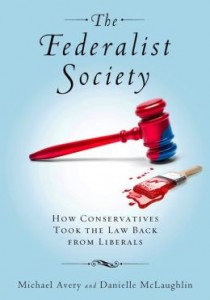

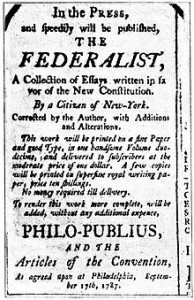
The Federalist Society: How Conservatives Took the Law Back from Liberals
Has the Department of Justice been taken over by a conservative organization little known to the average citizen? In the recently published book titled The Federalist Society: How Conservatives Took the Law Back from Liberals authored by attorney Michael Avery and Danielle McLaughlin track the movements of a small group of conservative law students and their influence. The Federalist Society has lawyer chapters in every major city in the United States and student chapters in every accredited law school. Members include economic conservatives, social conservatives, Christian conservatives, and libertarians. They all differ with each other on significant issues, but cooperate in advancing a broad conservative agenda.
Attorney Michael Avery:
- I saw how much power and influence the Federalist Society had during the years George W. Bush was president and at the same time I realized most people don’t know very much about them.
- They remained under the radar, I thought it was important to tell their story.
- They came along just at the right time for them, it was really kind of a perfect storm for them. Ronald Reagan was in the White House, you had a general renaissance of conservative thought that was promoted by people like Bill Buckley in the National Review, you had resistance to school integration and forced bussing. So there was a backlash waiting to happen against some of the things that happened in the law.
- It’s very important to recognize the role Ed Meese played. First he was counselor to the president then he was attorney general, later he became a principle figure at the Heritage Society.
- Many people are open members of the Federalist Society, others not so much but through a variety of sources I think we’re very confident that the people in that appendix either are members or very close to the society and sometimes I call that list the 100 most powerful people in the country and most of them you never heard of.
- About half the members that George W. Bush appointed to the Federal Court of Appeals were members of the Federalist Society.
- This battle over whether the government is able regulate private property has been one of the principle ideological battles of American Constitutional law since the end of the 19th century.
- They argue that property rights are a natural right that everybody is entitled to.
- It’s better to tolerate disagreement than to try to be 100 percent correct all the time.
Attorney Danielle McLaughlin:
- The substantive areas of law that we’re seeing this test cases brought in are very much reflective of the core values of the society. Those are notions of small government in particular small federal government. The idea that the state exists to preserve freedom.
- Many are involved in public interest law firms who go out and find plaintiffs and challenge regulation at the state level and in many cases have been successful in challenging laws in opposition to their world view all the way up to the Supreme Court.
- They really worked this very large network that they developed.
- Olen Foundation says here’s some money go out and build an institution.
- The Federalist Society today is not handicapped by having to report back or meet short term goals. The conservative funders believed in long term institution building.
- There are Federalist Society student groups on the campus of every single accredited and some unaccredited law schools. There are lawyer chapters in every single major city. There are affiliated Federalist Society groups outside the country.
Guest – Civil rights lawyer Michael Avery, professor at Suffolk University Law School and former president of the National Lawyers Guild from 2003 to 2006.
Guest – Co-author and attorney Danielle McLauglin, member of the Litigation and Dispute resolution group.
—–
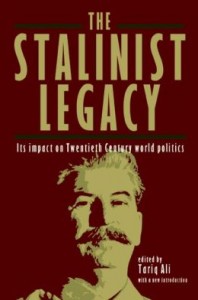
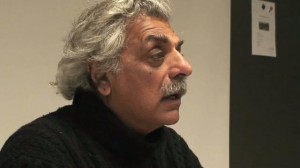
The Stalinist Legacy: Its Impact on Twentieth Century World Politics
We go now to hear a presentation by internationally acclaimed Pakistani writer and film maker Tariq Ali during a New York City book launch of his new book The Stalinist Legacy: Its Impact on Twentieth Century World Politics. Karl Marx’s often quoted observation “History weighs like a nightmare on the brain of the living” is so true. Even 20 years after the Soviet Union’s collapse, activists are still confronted by the legacy of Stalinism at the same time capitalism has failed millions of working people in the United States and across the world.
————–





























